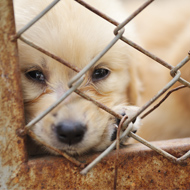
Activists report tense atmosphere in Yulin
An annual festival that sees people gather to eat dog meat has begun in southern China.
Approximately 10,000 dogs and cats are expected to be killed and eaten during The Lychee and Dog Meat Festival in Yulin.
The 10-day festival sees people assemble in the city to sample dog meat hotpot, local liquor and lychee fruits.
On Sunday (20 June), animal rights activists Humane Society International (HSI) rescued 20 sick and injured dogs from a slaughterhouse on the outskirts of Yulin.
"It was heartbreaking to see the dogs crammed into tiny cages and panting in the heat," said Adam Parascandola, HSI’s director of animal protection and crisis response.
"We gave them water, which most lapped frantically, and their tails wagged as we talked to them. I’m so relieved we were able to get these dogs out, and that soon they will know the love and comfort all animals should enjoy."
The HSI team reports that the atmosphere in Yulin is tense, but so far evidence suggests reduced killing and less visible dog meat eating then in previous years.
The Yulin authorities have set up checkpoints to stop incoming trucks filled with cats and dogs - a key proposal that HSI and its partners in China have lobbied for.
However, because many of the animals destined for slaughter have already been bought to Yulin, HSI are calling for the Government to take more decisive action, like shutting down slaughterhouses.
"We're still seeing market stalls and mopeds piled with the typical brown blowtorched bodies of dogs, but as yet nothing like the scale we feared, said Peter Li, China policy specialist for HSI.
"It's a muted Yulin for sure. The authorities seem nervous and are warning dog and cat traders not to engage with us and alerting government employees to stay away from the dog meat restaurants."
The tradition of eating dog meat dates back over 500 years in China, where many believe it wards off the summer heat.
Despite being a source of pride for many locals, the Yulin festival attracts widespread and growing criticism every year.



 The Animal and Plant Health Agency (APHA) has updated its online reporting service for dead wild birds.
The Animal and Plant Health Agency (APHA) has updated its online reporting service for dead wild birds.